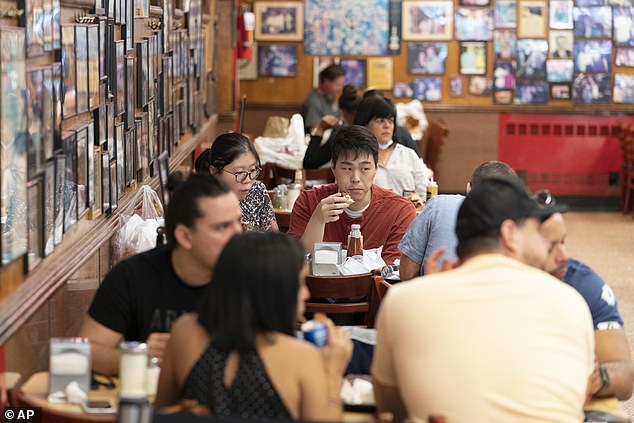New York Times restaurant critic Pete Wells quits position after his annual physical returned shock results – as he moans about the pitfalls of the job
New York Times critic Pete Wells has resigned from his career after discovering how bad eating out was for his health.
Wells wrote restaurant reviews for the Times for 12 years, lambasting some beloved establishments such as Peter Luger Steakhouse and Carbone.
But in a recent columnWells said he is obese and has serious health problems, including bad cholesterol, bad blood sugar and high blood pressure.
This has led Wells and other food critics to share their thoughts on the challenges of their work as culinary tasters.
“When you’ve been working for hours, stuffing your tray with mashed potatoes, rolls, cookies and an extra piece of pie, at some point you have to ask yourself if you’re standing in line for the crowd or for yourself,” Wells said.
New York Times restaurant critic Pete Wells (pictured) claimed his job made him obese and led to his poor health

Wells famously wrote restaurant reviews for the Times for 12 years, thoroughly dissing some beloved establishments like Peter Luger Steakhouse (pictured is the food).
‘Almost all of my 500 or so reviews were the result of eating three meals at the place I wrote about. Typically, I would take three people with me and ask them to order an appetizer, main course, and dessert. That’s 36 dishes I tried before I wrote a word.
“Then there are the reference meals, the meals we eat to stay informed, to not be a fraud. Often this is where I really got into trouble.”
Other food critics, like Wells, have been critical of their jobs, saying that visiting multiple restaurants a week and trying everything on the menu takes its toll.
“You have to try the full menu,” said Ligaya Figueras, senior food editor and lead dining critic for the Atlanta Journal-Constitution. “If I really want a salad today, I can’t just eat the salad.”
MacKenzie Chung Fegan, restaurant critic for the San Francisco Chronicle, tasted Peking duck all over the city for a story about a restaurant that specialized in the dish.
“There was a two-week period where I ate more duck than the doctor would recommend,” Fegan said.
In a 2020 study published in the Journal of Nutrition, researchers from the Friedman School of Nutrition Science and Policy at Tufts University found that 50 percent of meals at U.S. full-service restaurants—and 70 percent of those at fast-food restaurants—were of poor nutritional quality, according to American Heart Association guidelines. Less than 1 percent were of ideal quality.

Wells criticized the three-Michelin-starred restaurant Eleven Madison Park’s 2021 all-vegan tasting menu (pictured, a plate of eggplant, tomato and coriander)

Carbone — a Greenwich Village red sauce restaurant (pictured, rigatoni) beloved by celebrities and high-status individuals — lost a Michelin star after Wells reviewed it in 2022
Dariush Mozaffarian, a cardiologist and Tufts professor and one of the study’s authors, said restaurant meals typically contain fewer whole grains and legumes than ideal, slightly fewer fruits and vegetables, and slightly more salt and saturated fat.
During the period the study examined, between 2003 and 2016, the nutritional quality of food in grocery stores improved, Mozaffarian said. But restaurants did not make similar changes, he said.
“I can’t tell you how many restaurants I go to and everyone’s plate is covered in fries,” Mozaffarian said. “There’s not an equal and diverse array of healthy and unhealthy menu choices.”
Fegan said honestly, diners are looking for something tasty when they eat out, “and often that means something with fat and salt.”
“When I look at the menu and think, ‘What’s the most exciting thing on the menu?’ it’s probably not a serving of broccoli rabe,” she said.
Figueras deals with the challenge in different ways. On nights when she doesn’t eat out, she says she’s “hyper alert” and eats mostly vegetables. She plays tennis and walks her dog to stay in shape. And when she does go to a restaurant, she eats fruit or another healthy snack so she doesn’t arrive hungry.
“Everything tastes good when you’re hungry,” she said.

Wells and other critics have said that the challenges of their jobs as food tasters include eating out several times a week.

Restaurant critics said one of the downsides is that you have to try dishes from the entire menu, even though it might not be what you want to eat that day.
Lyndsay Green, Detroit Free Press food and restaurant reviewer, tries to eat healthy even on her days off. She gets most of her food from her local farmers market.
Green said she thinks menus are becoming healthier. Many chefs are offering gluten-free or vegan options, she said, and are getting more creative with their nonalcoholic cocktail menus.
She thinks restaurant critics can help readers by being open about their own needs. For example, a pregnant critic could write a restaurant guide for other expectant parents.
“Almost everyone has health issues and nutritional standards, so I think it’s our job to talk about that in our work as well,” she said.
Wells will write a few more reviews before stepping down in early August, but will remain at the Times. Times food writers Melissa Clark and Priya Krishna will serve as interim restaurant critics, the newspaper said.
Wells said he will continue to go to restaurants and may even enjoy them more now that he is no longer distracted by work. He said he will be sad to lose touch with New York’s seemingly endless restaurant scene, but will be happy to find more balance in his own life.
